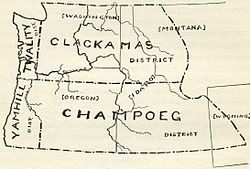User:Voltaire's Vaquero/PGO
Provisional Government of Oregon | |||||||||
|---|---|---|---|---|---|---|---|---|---|
| 1843–1849 | |||||||||
The Salmon Seal of the PGO[1]
| |||||||||
 Original districts of the government with the eventual U.S. borders and states | |||||||||
| Capital | Oregon City | ||||||||
| Common languages | English, French | ||||||||
| Government | Republic | ||||||||
| Executive | |||||||||
• 1843-1845 | Executive Committee | ||||||||
• 1845-1849 | Governor Abernethy | ||||||||
| Legislature | Single chamber | ||||||||
| History | |||||||||
| May 2 1843 | |||||||||
| March 3 1849 | |||||||||
| Currency | Beaver skins,[2] Wheat,[3] U.S. dollar, Mexican peso[2], Peruvian real,[2] | ||||||||
| |||||||||
The Provisional Government of Oregon was a popularly elected settler government created in the Oregon Country, in the Pacific Northwest region of North America. It provided a legal system and a common defense amongst the mostly American pioneers settling an area then inhabited only by the many Indigenous Nations. Much of the region's geography and many of the Natives were not known by people of European descent until several exploratory tours were authorized at the turn of the 18th and 19th centuries. According to a message from the government in 1844, the rising settler population was beginning to flourish among the "savages", who were "the chief obstruction to the entrance of civilization" in a land of "ignorance and idolatry."[4]
Structure
[edit](The modern Oregon law is based off of the law, though now both sexes are included, and the age range is only 18 to 45.)[5]
Executive Committee
[edit]The Executive Committee was a three person body with the powers to recommend laws to the legislature, grant pardons, and use the militia to "repel invasion, or suppress insurrection".[6] The first Committee was elected on 5 July 1843, with Alanson Beers, David Hill and Joseph Gale taking office.[4] Elected on May 14, 1844, Peter G. Stewart, Osbourne Russell, William J. Bailey formed the second Executive Committee.[1]
Legislative Committee
[edit]The Provisional Legislature held sessions mainly in Oregon City. Under the first organic laws there were nine members.[6]
Judicial branch
[edit]The judiciary, forerunner of the Oregon Supreme Court, consisted of a single supreme judge, elected by the settlers or appointed by the legislature,[7] and two justices of the peace.[8] The lower probate court and justice courts could only hear cases with claims less than $50 and did not involve land disputes.[8] ***[9]
2nd Organic Laws
[edit]"a real government could not have been said to have existed in practice until 1845..."[10]
enacting various laws, sent memorials to Congress, incorporated towns and organizations, granted divorces and licenses to run ferries.[4][11]
Laws
[edit]The sale of alcohol was banned, though "blue ruin" was sold to natives in Oregon City.[12] The sales of fire arms to "all Indians" was banned in December 1847.[13] In 1844, the legislature passed a law banning the sale of ardent spirits, out of concern that the Native Americans would become hostile if intoxicated. [14]
The President appraised the ongoing conflict between the white colonists and Cayuse as the result of the United States not assuming control of the Oregon Country and giving "some trifling compensation, in such articles as they wanted, for the country now occupied by our emigrants, which the Indians claimed and which they formerly roamed."[15]
A flag with a single star and several stripes was used by some troops during the fight against the Cayuse tribe.[4]
- ^ a b Cite error: The named reference
Hornerwas invoked but never defined (see the help page). - ^ a b c Cite error: The named reference
Scottwas invoked but never defined (see the help page). - ^ Cite error: The named reference
Streveywas invoked but never defined (see the help page). - ^ a b c d Brown, J. Henry (1892). Brown's Political History of Oregon: Provisional Government. Portland: Wiley B. Allen. LCCN rc01000356. OCLC 422191413.
- ^ Oregon Revised Statutes 10§396. Published by the Legislative Counsel Committee of the Oregon Legislative Assembly. 2005. Retrieved on July 20, 2007.
- ^ a b The Organic Act in Grover, Lafayette. The Oregon Archives. Salem: A. Bush. 1853, pp. 26-35
- ^ "Oregon Supreme Court Justices". Oregon Blue Book. Oregon Secretary of State. Retrieved 2007-03-16.
- ^ a b Cite error: The named reference
Groverwas invoked but never defined (see the help page). - ^ http://books.google.com/books?id=eas-AAAAYAAJ&dq=Bancroft%20Victor%20Oregon%20Vol%201&pg=PA477#v=onepage&q=1845%20applegate&f=false
- ^ Hussey, John A. Champoeg: Place of Transition, A Disputed History. Portland: Oregon Historical Society. 1967. p. 172
- ^ Clarke, S. A. [books.google.com/books?id=teRYAAAAMAAJ&source=gbs_navlinks_s Pioneer Days of Oregon History, Volume 2.] Portland, OR: J.K. Gill Co. 1905
- ^ Cite error: The named reference
Victorwas invoked but never defined (see the help page). - ^ Oregon Territorial Government. Laws of a General and Local Nature passed by the Legislative Committee and Legislative Assembly. Salem, OR: Asahel Bush. 1853.
- ^ http://oregonnews.uoregon.edu/lccn/sn84022662/1846-12-24/ed-1/seq-3/
- ^ http://books.google.com/books?id=B3kA2dMHousC&dq=fourth%20annual%20message%20polk&pg=PA645#v=onepage&q&f=false

![The Salmon Seal of the PGO[1] of Oregon Country](http://upload.wikimedia.org/wikipedia/commons/thumb/7/75/Oregon_Provisional_Government_Seal.png/85px-Oregon_Provisional_Government_Seal.png)